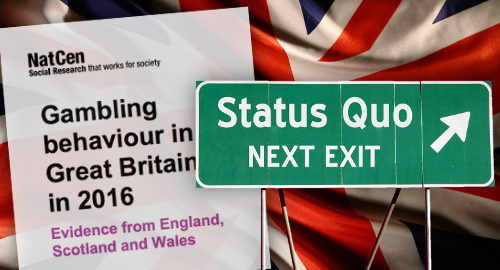 The UK’s ranks of problem gamblers remained constant in the most recent survey of gambling behavior, despite the constant media narrative that gambling is pushing society into anarchy.
The UK’s ranks of problem gamblers remained constant in the most recent survey of gambling behavior, despite the constant media narrative that gambling is pushing society into anarchy.
On Thursday, the UK Gambling Commission (UKGC) released the results of its Gambling Behavior in Great Britain 2016 survey, which crunches data from health reports in England, Scotland and Wales to determine gambling participation, frequency and problem gambling prevalence.
The headline figure is the 1.2% of gamblers who were designated as problem gamblers, equal to about 0.7% of the overall population. These numbers are on par with the numbers in similar surveys for 2012 and 2015, and equivalent to figures cited in international markets, despite the UK having by far the most legal gaming options of any developed market.
Moreover, the overall gambling participation rate for UK residents aged 16 or older was 57%, down from 63% in 2015 and 65% in 2012. Excluding individuals who only gamble on National Lottery draws, participation was down three points from 2015 to 42%.
The overall online gambling participation rate was 9%, down one point from 2015. Online sports betting participation gained one point to 8% while online casino/bingo gambling fell one point to 3% and exchange betting held firm at 1%.
As with previous surveys, online casino/bingo gambling recorded a relatively low rate of problem gambling prevalence (9.2%), and this was down from 10.6% in the 2015 survey. Online sports betting’s score was a mere 2.5%, less than half 2015’s figure. Exchange betting’s score also tumbled from 16.2% in 2015 to just 5.4%.
Compare those figures with a 13.7% score for fixed-odds betting terminals (FOBT) in betting shops, up from 11.6% in 2015, or betting offline on ‘other events’ aka not racing or sports (13.1%, down from 15.5%) and offline dog racing (9.5%, up one point).
Spread betting reported a problem gambling prevalence of 8%, way down from 20.1% in 2015. The UK imposed new restrictions on spread betting operators in late 2016, too late for the impact to be shown in these results, but UK regulators had publicly scolded firms that February, and the drumbeat of negative headlines may have helped curb the public’s appetite for these products.
Problem gamblers were far more likely to show symptoms of general mental ill health (2.2%) than those with less than optimal mental health (0.6%) or no evidence of mental problems (0.2%). Gamblers who consumed larger quantities of alcohol were also more likely to have gambling problems (0.8%) than teetotalers (0.3%).
This jibes with previous studies that indicate problem gamblers display all sorts of excessive behavior that go far beyond gambling. A growing body of evidence points to problem gambling being the result of different brain chemistry that scientists are now studying to develop measures to help these individuals cope with their addictions.
NHS BOSS SLAMS INTERNATIONAL FREELOADERS
The latest survey was preceded by Simon Stevens, the head of the National Health Service (NHS), publicly shaming gambling operators for failing to ante up a proper amount of funding for the industry’s GambleAware charity, leaving UK taxpayers to “pick up the pieces.”
The eight international (primarily Asian-facing) betting operators who sponsor Premier League football clubs were singled out for particular scorn, with Stevens saying “we need to get onto the Premier League to make sure they contribute.”
GambleAware echoed Stevens’ comments, saying the group was “seriously concerned the relationship between sport and gambling has reached a tipping point.” The Remote Gambling Association industry body reiterated its call for a “statutory levy to ensure the correct level of funds are raised in a fair and open process.”